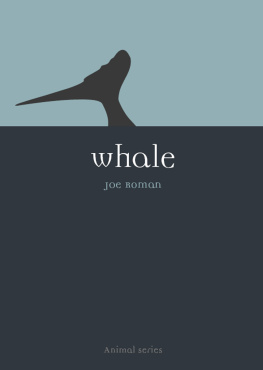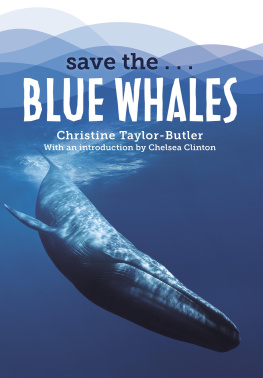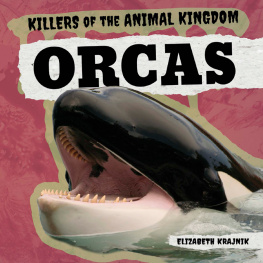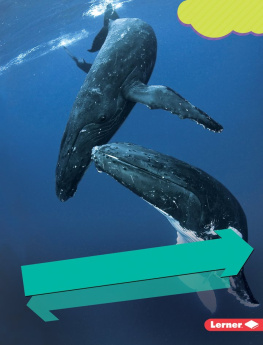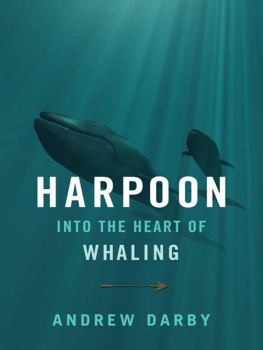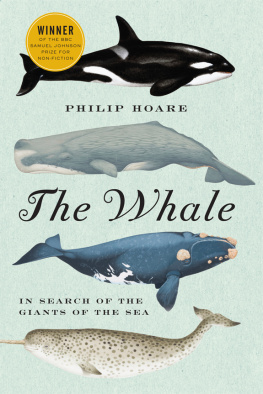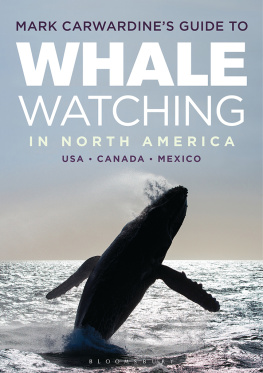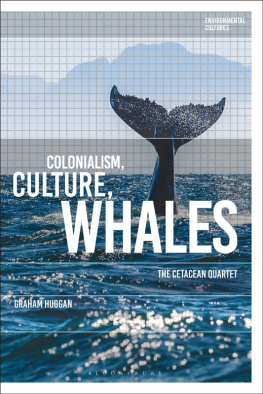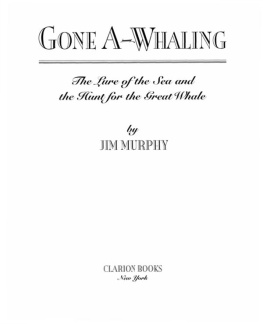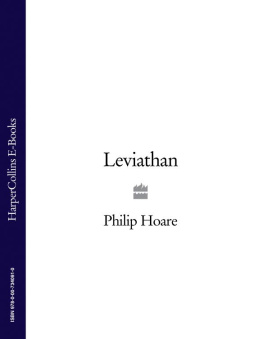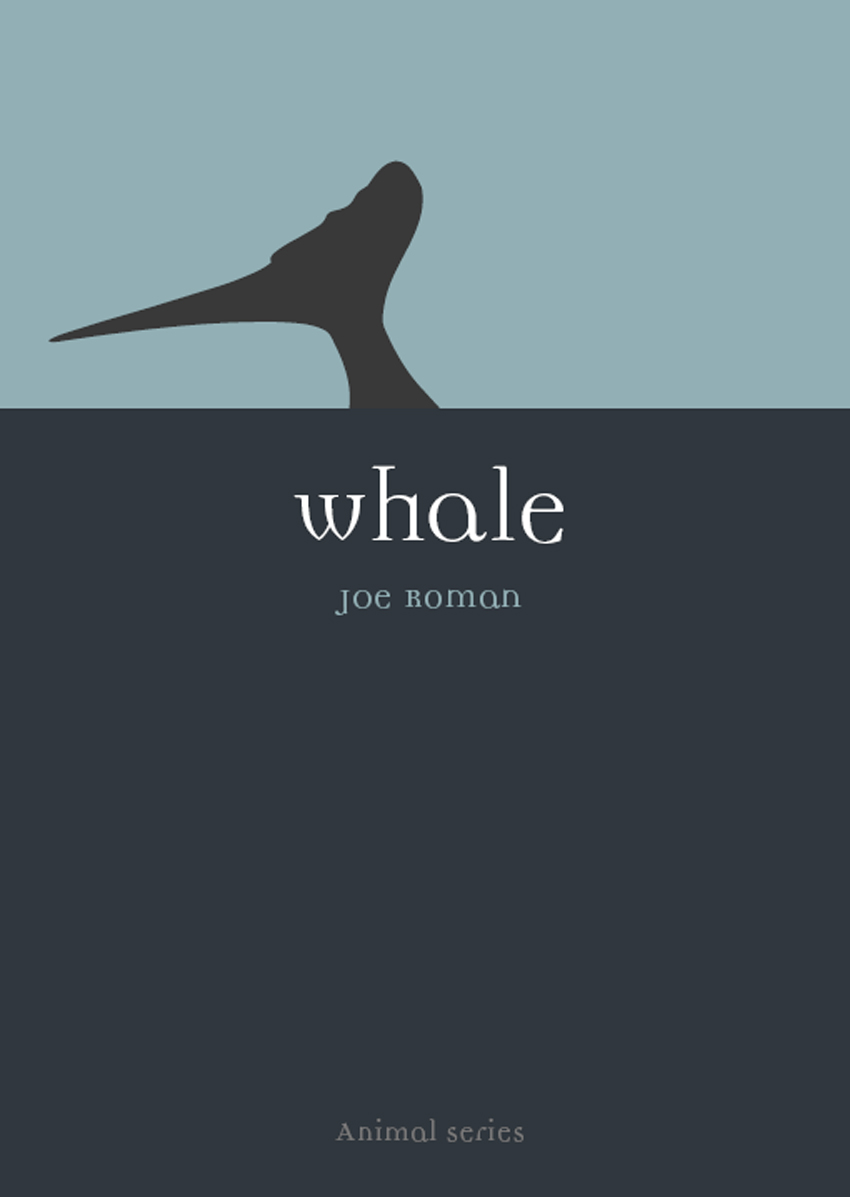Whale

Animal
Series editor: Jonathan Burt
| Already published |
Crow
Boria Sax | Bear
Robert E. Bieder |
Tortoise
Peter Young | Parrot
Paul Carter |
Cockroach
Marion Copeland | Rat
Jonathan Burt |
Ant
Charlotte Sleigh | Snake
Drake Stutesman |
Dog
Susan McHugh | Falcon
Helen Macdonald |
Oyster
Rebecca Stott | Bee
Clare Preston |
| Forthcoming |
Hare
Simon Carnell | Crocodile
Richard Freeman |
Moose
Kevin Jackson | Spider
Katja and Sergiusz Michalskj |
Fly
Steven Connor | Duck
Victoria de Rijke |
Tiger
Susie Green | Salmon
Peter Coates |
Fox
Martin Wallen | Wolf
Garry Marvin |
For Debora Greger
Published by
REAKTION BOOKS LTD
33 Great Sutton Street
London EC1V 0DX, UK
www.reaktionbooks.co.uk
First published 2006
Copyright Joe Roman 2006
All rights reserved
No part of this publication may be reproduced, stored in a retrieval system or transmitted, in any form or by any means, electronic, mechanical, photocopying, recording or otherwise without the prior permission of the publishers.
Page references in the Photo Acknowledgements and
Index match the printed edition of this book.
Printed and bound in Hong Kong
British Library Cataloguing in Publication Data
Roman, Joe
Whale. (Animal)
1. Whales 2. Animals and civilization
I. Title
599.5
eISBN: 9781861895059
Contents
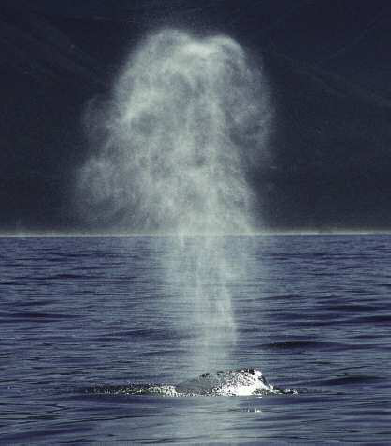
First Surfacing
A column of mist splits the horizon, followed by a deep, unearthly sound, as if the ocean itself had come up for air. A bright glimmer flashes beneath the ghostly blows, as a sleek dark back sinks into the ripples. A V-shaped tail impales the surface, then disappears.
To someone standing on a coastal bluff or on the shifting shore, these spouts caused wonder, curiosity, even fear. The ocean was the realm of the sea monster, the great fish, or whale. In ancient Greek, the animal that created them was called phallaina. The origins of the word are obscure perhaps from a root meaning blow or swell, or perhaps from phallus or phallos, for cork. (As the classicist William Wyatt noted, scholars are embarrassed about the word.) Its origin may be obscure, but phallaina has survived in Latin as balaena and is retained in Spanish, ballena, in French, baleine, and in our own baleen. In Old English, it was hwl, a word of Scandinavian origins. Our modern whale aspires to retain the soft echo of a blow. But the beast was also known as Cetus, the great fish, leviathan, the monster of the deep.
The shore-bound observer might have caught a glimpse, a flipper rising above the surface like a dark black sail, but only the seafarer, making the ocean paths his home, came face-to-face with this spouting beast. To an anonymous English poet of theninth century AD, the sea belonged to this whale:
my heart leaps within me,
my mind roams with the waves
over the whales domain, it wanders far and wide
across the face of the earth, returns again to me
eager and unsatisfied; the solitary bird screams,
irresistible, urges the heart to the whales way
over the stretch of the seas.
Viewed across the ocean, the whales exhalation, condensed into a visible column of mist, was usually the first indication of a whales presence. To some, this blow was a chimney. Early Arabian travellers saw minarets, or the sails of a distant ship.
Even Nearchus, the commander of Alexander the Greats fleet, feared the wrath of these sea monsters. He ordered his crew to blow trumpets and beat drums as his ships passed the huge beasts. When the whales approached the ships, the frightened oarsmen were hardly able to row.
Pliny the Elder described how the largest animal in the Bay of Biscay raises itself up like an enormous pillar, towering above the sails of the vessels and spouting a flood of water. When a whale appeared off the coast of Ostia during the reign of Claudius,
Cetus, the sea monster or whale, appears early in the Bible, populating the seas on the fourth day: And God said, Let the waters bring forth abundantly the moving creature that hath life... And God created great whales and every living creature that moveth, which the waters brought forth abundantly, after their kind (Genesis I, 2021).
It was not until modern translations of the Bible, such as the King James version quoted from above, that whales were distinguished from other large sea animals. For much of recorded history, there was little cosmological distinction between a sea monster, a cetacean or a great fish. Perhaps this is best exemplified in the Old Testament, where the whale appears in the form of leviathan. In the story of Job, God tells the persecuted man that He is beyond human measure. Speaking from the whirlwind, God uses the leviathan as an example:
Canst thou draw out leviathan with an hook? or his tongue with a cord which thou lettest down? Canst thouput an hook into his nose? or bore his jaw through with a thorn?... Who can open the doors of his face? his teeth are terrible round about. His scales are his pride, shut up together as with a close seal... and his eyes are like the eyelids of the morning. Out of his mouth go burning lamps, and sparks of fire leap out. Out of his nostrils goeth smoke, as out of a seething pot or cauldron... Upon earth there is not his like who is made without fear.
Like God, the leviathan cannot be measured by man, or even understood by him. Yet despite its serpentine, draconic traits, the leviathan would become a synonym for cetacean.
Whale ribs, mandibles and scapulae were mounted in churches throughout the Middle Ages, providing osteological evidence of the leviathan. These hierozoika items from the natural world held sacred for their mention in the Gospels helped to sanction the power of the Church and local feudal lords, for according to the whaling historian Klaus Barthelmess, the owner of these items had the world in his hands. Church vaults might harbour ostrich eggs or stuffed crocodiles, but as Spenser wrote in The Fairie Queene, there was nothing on land that could compare with the whale and the other monsters of the sea:
For all that here on earth we dreadfull hold
Be but as bugs to fearen babes withall
Compared to the creatures in the seas entrall
By far, the Bibles most renowned whale is the great fish that swallowed Jonah. When God sends him to Nineveh to save the city, Jonah tries to escape by sea, fleeing to the maritime country of Tarshish. God sends a great wind over the ocean, and to prevent the loss of the ship, Jonah is cast into the sea. Now the Lordhad prepared a great fish to swallow up Jonah. And Jonah was in the belly of the fish three days and three nights. From the deep, Jonah prays for forgiveness:
The waters compassed me about, even to the soul: the depth closed me round about, the weeds were wrapped about my head... When my soul fainted within me I remembered the Lord: and my prayer came in unto thee, into thine holy temple.

